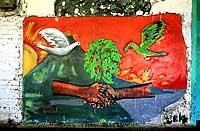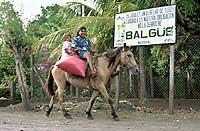Coffee binds Bainbridge Island to Nicaragua island
But the coffee bean has helped forge an enduring bond between Bainbridge Island and this rugged tropical outpost in the middle of Lake Nicaragua.
For nearly 15 years, dozens of Ometepe farmers have sent their organic, shade-grown coffee to be sold on Bainbridge, their isla hermana — sister island — in the Pacific Northwest.
Profit from the coffee is sent back to Ometepe, paying for projects ranging from new schools to village water systems. All are built by the Nicaraguans, with occasional help from Bainbridge teenagers and other volunteers.
"There's no better example of a community than an island," said Kim Esterberg, co-founder of the Bainbridge-Ometepe Sister Island Association with his wife, Ela.
"So if you're going to connect two places together and you happen to live on an island, that's a real easy one for getting a sense of place."
In 1986, as debate raged over U.S. involvement in Nicaragua's Contra war, Esterberg collected $10 donations from each of 100 Bainbridge residents and bought a plane ticket to Nicaragua's capital, Managua, in search of a sister island. At the time, Seattle and Managua were sister cities.
Esterberg was steered to Ometepe, a verdant, slow-paced island with about 35,000 people and two volcanoes. He pitched the sister-island idea to mayors of the island's two largest towns and returned to Ometepe in 1988 with eight people from Bainbridge.
"We wanted the connection to outlast governments on either side," said Bainbridge resident David Mitchell, one of the original eight volunteers.
It has, in large part because of coffee.
The sister relationship got an unlikely boost after the contra war when Nicaragua's Sandinista government was bounced out of power in the 1990 elections.
The Sandinistas' defeat ended a U.S. trade embargo with Nicaragua and provided a financial boon to Ometepe farmers, who finally would be able to export to the U.S. the gourmet-quality coffee they had been growing on the slopes of the Maderas volcano.
The community was producing plenty of coffee but had no outside market until the embargo was lifted, said Bernabe Lopez Castillo, an Ometepe farmer and former president of the island's Carlos Díaz Cajina Cooperative. Farmers had been selling their crops mainly to the government.
Natural partnership
As a specialty-coffee mecca, the Seattle area was a natural trade partner for Ometepe. Volunteers from Bainbridge filled suitcases with more than 2,000 pounds of coffee beans and brought them home. The coffee sold well at Bainbridge's Town and Country Thriftway and a local coffee shop, Pegasus Coffee.
A year later, the sister-island group bought Ometepe's entire crop, sold the beans to Puget Sound-area stores and spent the profit building a water system in the village of San Pedro, bringing drinking water to 65 families on the Nicaraguan island.
Today, the association buys about 14,000 pounds of Ometepe coffee a year, paying co-op members $1.61 a pound, 35 cents a pound more than the international Fair Trade standard of $1.26. But because the coffee is packaged and sold by volunteers, the organization turns a $40,000 yearly profit from selling Café Oro de Ometepe to local coffee shops and grocery stores.
"The coffee connection has meant that this is one organization that doesn't have to raise money," Esterberg said. "It also has been a way of involving a lot of people on Bainbridge Island, because the whole coffee project requires quite a few hands."
The volunteer effort on Bainbridge spans generations. Senior-center residents slap Café Oro labels onto 16-ounce bags. High-school students travel to Ometepe each spring break, staying with host families while helping to construct the latest project funded by coffee profits.
Thursday afternoons, volunteers filter into Pegasus Coffee's roasting plant to bag freshly roasted coffee and ship orders placed via the Internet from around the country.
Sometimes, Ometepe residents help get the coffee ready to sell. Earlier this year, a trio of teachers from Ometepe took part in the ritual, working alongside Bainbridge volunteers.
"We can see now how the people are working here to help the people on the (Ometepe) island," Lucybeth Morgan Cruz said.
The sister-island effort has drawn admirers, even imitators, in specialty-coffee circles.
Jim Stewart, founder of Seattle's Best Coffee, said he had been considering forming his own coffee-inspired foundation in the early 1990s when he came across an article about the Bainbridge-Ometepe group in an airline magazine.
"Suddenly, there it was, all laid out," Stewart said. "Not only did they do this, they did it in the middle of a revolution."
The Bainbridge association became a model for Stewart's Vashon Island Coffee Foundation, which has built schools and provided water pumps for coffee workers in such countries as Guatemala and Peru.
New classrooms
Evidence of the sister relationship with Bainbridge abounds across Ometepe, a rustic island deriving its name from a Nahuatl word meaning "two hills."
At Balgüe Elementary School, beaming children in pressed white shirts and navy-blue pants and skirts file into four new classrooms on a February morning, the first day of the school year.
The new rooms, built last year and paid for by coffee profits, are painted blue and white and have concrete foundations, tile floors and screen windows. Along with the classrooms came donated supplies such as chalk and construction paper, which teachers often buy with their own money.
Third-grade teacher Thelma Mairena Zeledón says the new classrooms are a vast improvement over the older ones across the playground. In those rooms, where Zeledón attended school three decades ago and classes still take place, floors are sinking and ventilation is poor.
"The kids like it a lot better," Zeledón said. "We all prefer working here."
A mile or so down the road, Aura María Flores, 56, no longer has to make several half-hour trips a day to a nearby stream. Spring water from the volcano that looms over her village is now piped directly to her home.
Flores was one of dozens of Balgüe residents who spent 23 days building a water system paid for by coffee profits. And as a member of the co-op that sells coffee to Bainbridge, Flores says the sister relationship has helped bring her a steady income.
Flores' two-room house, where walls are papered with Christmas wrap, is constantly filled with her children and grandchildren. The house is next to a dirt soccer field where her 21-year-old son, Manuel, coaches a girls' soccer team outfitted with cleats and a soccer ball donated by Bainbridge residents.
"It's been a bridge for us, this friendship," Flores says while roasting coffee beans in her kitchen for her family and guests.
A few dozen steps from Flores' house, a community center hosts literacy classes for kids who can't afford school, in a project funded by Bainbridge's Grace Episcopal Church. And in the nearby town of Merida, teens attend a school named after Robert Drew, a Bainbridge resident and sister-island board member who died in 2001.
Over the years, the connection between the islands has extended well beyond coffee.
Scores of Bainbridge residents donate money each year for scholarships to send Ometepe students to Nicaraguan universities.
About 40 people have given $1,000 to build small homes for Ometepe families, a staggeringly low sum compared with Bainbridge, where the median home price is nearly $410,000.
Third-graders at Bainbridge's Wilkes Elementary School have created and sold calendars for 11 years to raise money for projects on Ometepe, including a school library.
"For a third-grade class of 24 children to be able to build a school library someplace on Earth is incredible," Esterberg said. "Most people couldn't do this. But here they're in the third grade, and they've already done it. That just inspires people."
Irene Keliher worked as Spanish translator in Nicaragua.
Jake Batsell: jbatsell@hotmail.com
Betty Udesen: budesen@seattletimes.com

